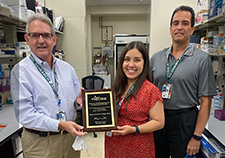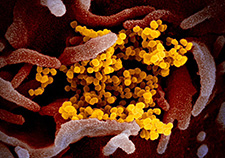Office of Research & Development |
 |
COVID-19 FACT SHEET |
In response to the COVID-19 pandemic, VA Research has undertaken a wide array of activities to support and advance VA's clinical and research missions and help Veterans affected by the disease. These efforts have spanned biomedical research, therapeutics and vaccine clinical trials, and data analyses that leverage VA's rich electronic health record system. VA Research has coordinated closely with internal VA and external partners—such as the National Institutes of Health and other federal agencies, and pharmaceutical companies—to identify the areas in which VA's nationwide research capacity, resources, and infrastructure could make the greatest contribution.
On this web page, we summarize recent and current COVID-19 research across the VA system.
VHA COVID-19 Research Dashboard
This interactive map shows active VA studies on COVID-19. Use the search bar or menus on the left to find studies on specific topics or locations. View larger version
Arthritis drug decreases delirium, coma in critically ill COVID-19 patients
A study including a VA Tennessee Valley researcher found the arthritis drug tocilizumab can decrease delirium and coma in critically ill patients with COVID-19. The study included 253 patients with COVID-19 being treated in the ICU, 69 of whom received tocilizumab. The tocilizumab group had a greater number of days without delirium or coma. The drug did not affect mortality, ventilator use, or hospital length of stay. The results indicate tocilizumab could be an effective way to address delirium and comas in severely ill COVID-19 patients. (Scientific Reports, May 23, 2024)
Blood pressure control in Veterans declined during COVID-19 pandemic
A multi-institution team led by researchers at the White River Junction VA Medical Center in Vermont found that, in a group of nearly 1.65 million Veterans, 7% had a decline in blood pressure control during the COVID-19 pandemic. Most of the difference was explained by delays in follow-up care in Veterans whose blood pressure had been under control before the pandemic. Conversely, those who had uncontrolled high blood pressure before the pandemic were slightly more likely to gain control during the pandemic, suggesting providers focused more on people with uncontrolled blood pressure during this time. (Medical Care, Mar. 1, 2024)
Long COVID more likely in Veterans with psychiatric disorders
VA San Francisco researchers learned Veterans with at least one psychiatric disorder were 28% more likely to be diagnosed with long COVID after a COVID-19 infection. Out of more than 660,000 Veterans who tested positive for COVID-19, those with depression, anxiety, and stress-related disorders had the highest risk of long COVID. The connection between psychiatric disorders and long COVID was most prominent in younger Veterans. The findings highlight a need to improved monitoring for long COVID symptoms in Veterans with psychiatric disorders. (Psychological Medicine, Feb. 5, 2024)
Both COVID and flu increase long-term health risks, but COVID’s risk is greater
VA St. Louis researchers proved COVID-19 confers a higher risk of death and long-term health outcomes than the flu in nearly every organ system. The study included more than 81,000 VA patients admitted to the hospital with COVID-19 and nearly 11,000 admitted with seasonal influenza. Over an 18-month follow-up period, the risk of long-term health problems was only higher from the flu for the pulmonary system. However, both viruses caused a substantial risk in long-term health loss, prompting the researchers to call for greater prevention efforts and more attention to the needs of people with long-term health effects from either COVID-19 or influenza. (The Lancet Infectious Diseases, Dec. 14, 2023)
VA hospitals had lower COVID-19 mortality rates than community hospitals
Iowa City VA Health Care System researchers learned that Veterans hospitalized for COVID-19 in VA hospitals were less likely to die than those treated in community hospitals. The study included data on nearly 65,000 Veterans 65 years old or older who were hospitalized with COVID-19 between March 2020 and December 2021. Veterans in community hospitals had a 27% risk of death within 30 days of hospitalization, compared with an 18% risk for those admitted to VA hospitals. However, about 74% of Veterans were admitted to community hospitals rather than VA hospitals. The results show that quality of VA health care compares favorably to non-VA care, but more efforts may be needed to ensure Veterans receiving care in the community get the best quality care. (JAMA Network Open, May 1, 2023)
Clinical Trials
Favorable antiviral effect of metformin on severe acute respiratory syndrome coronavirus 2 viral load in a randomized, placebo-controlled clinical trial of coronavirus disease 2019 . Bramante CT, Beckman KB, Mehta T, Karger AB, Odde DJ, Tignanelli CJ, Buse JB et al. Metformin reduced SARS-CoV-2 viral load 3.6-fold compared to placebo. Clin Infect Dis. 2024 May 1. Online ahead of print.
High-dose fluvoxamine and time to sustained recovery in outpatients with COVID-19: The ACTIV-6 randomized clinical trial . Stewart TG, Rebolledo PA, Mourad A, Lindsell CJ, Boulware DR, McCarthy MW et al. Among outpatients with mild to moderate COVID-19, treatment with fluvoxamine does not reduce duration of COVID-19 symptoms. JAMA. 2023 Nov 17. Online ahead of print.
Core warming of coronavirus disease 2019 patients undergoing mechanical ventilation: A pilot study . Bonfanti NP, Mohr NM, Willms DC, Bedimo RJ, Gundert E, Goff KL, Kulstad EB, Brewry AM. This pilot study suggests that core warming of patients with COVID-19 undergoing mechanical ventilation is feasible and appears safe. Inducing fever has potential to improve respiratory physiology in patients with COVID-19. Ther Hypothermia Temp Manag. 2023 Aug 2. Online ahead of print.
Intravenous aviptadil and remdesivir for treatment of COVID-19-associated hypoxaemic respiratory failure in the USA (TESICO): A randomised, placebo-controlled trial . Brown SM, Barkauska CE, Grund B, Sharma S, Phillips AN, Leither L, Peltran ID et al. Among patients with COVID-19-associated acute hypoxaemic respiratory failure, aviptadil did not significantly improve clinical outcomes up to day 90 when compared with placebo. Lancet Respir Med. 2023 Jun 19. Online ahead of print.
Outpatient treatment of COVID-19 and incidence of post-COVID-19 condition over 10 months (COVID-OUT): a multicentre, randomised, quadruple-blind, parallel-group, phase 3 trial . Bramante CT, Buse JB, Liebovits DM, Nicklas JM, Puskarich MA, Cohen K, Belani HK, Anderson BJ et al. Outpatient treatment with metformin reduced long COVID incidence by about 41% compared with placebo. Lancet Infect Dis. 2023 Jun 8. Online ahead of print.
Laboratory Studies
Evidence from whole genome sequencing of aerosol transmission of SARS-CoV-2 almost 5 hours after hospital turnover . Charness ME, Gupta K, Linsenmeyer K, Strymish J, Madjarov R, Stack G. Airborne SARS-CoV-2 virus may transmit infection for over four hours, even in a hospital setting. Am J Infect Control. 2024 Jul;52(7):849-851.
Intranasal neomycin evokes broad-spectrum antiviral immunity in the upper respiratory tract . Mao T, Kim J, Peña-Hernández MA, Valle G, Moriyama M, Luyten S, Ott IM et al. Prophylactic or therapeutic administration of neomycin provided significant protection against upper respiratory infection in a model of COVID-19. In healthy humans, intranasal application of neomycin-containing Neosporin ointment induced an effective gene response that could protect from COVID-19. Proc Natl Acad Sci U S A. 2024 Apr 30;121(18):e2319566121.
Evidence from whole genome sequencing of aerosol transmission of SARS-CoV-2 almost five hours after hospital room turnover . Charness ME, Gupta K, Linsenmeyer K, Strymish J, Madjarov R, Stack G. Airborne SARS-CoV-2 may transmit infection for over four hours, even in a hospital setting. Am J Infect Control. 2024 Apr 5. Online ahead of print.
Blood markers show neural consequences of long COVID-19 . Tang N, Kido T, Shi J, McCafferty E, Ford JM, Dal Bon K. This study shows chronic peripheral inflammation with increased stress after COVID-19 infection. Additionally, differentially expressed neurodegenerative proteins were identified in people recovering from COVID-19 regardless of persistent symptoms. Cell. 2024 Mar 8;13(6):478.
Viral and host factors are associated with mortality in hospitalized patients with COVID-19 . Aggarwal NR, Nordwall J, Braun DL, Chung L, Coslet J, Der T, Eriobu N et al. Researchers identified virus-specific, clinical, and biological variables strongly associated with COVID-19 mortality risk within 90 days, revealing potential pathogen and host-response therapeutic targets for acute COVID-19 disease. Clin Infect Dis. 2024 Feb 20. Online ahead of print.
Data Analysis/Review
Postoperative outcomes associated with the timing of surgery after SARS-CoV-2 infection . Leeds IL, Park LS, Akgun K, Weintrob A, Justice AC, King JT Jr. In a contemporary surgical cohort, patients with prior COVID-19 infection only had increased postoperative mortality or complications when they had surgery within 14 days after the positive test. Ann Surg. 2024 Aug 1;280(2):241-247
One-year recovery among survivors of prolonged severe COVID-19: A national multicenter cohort . Makam AN, Burnfield J, Prettyman E, Nguyen OK, Wu N, Espejo E, Blat C et al. Nearly two-thirds of survivors of among the most prolonged severe COVID-19 illness had persistent impairment at one year that resembled post-intensive care syndrome after critical illness plus debility from hospital-acquired complications. Crit Care Med. 2024 Jul 1;52(7):e376-e389.
The association of non-severe COVID-19 infection and progression to frailty among robust older Veterans . Resendes NM, Bradley J, Tang F, Hammel IS, Ruiz JG. Non-severe COVID-19 infection that occurred in robust older adults increased the risk of developing frailty. J Nutr Health Aging. 2024 Jun 19;28(8):100296.
Patients taking benralizumab, dupilumab, or mepolizumab have lower postvaccination SARS-CoV-2 immunity . Runnstrom MC, Lamothe PA, Faliti CE, Cheedarla N, Moreno A, Suthar MS, Nahata R et al. Patients taking biologic medications for asthma or allergies had lower post-vaccination COVID-19 immunity. J Allergy Clin Immunol. 2024 Jun 13. Online ahead of print.
Meta-analysis of cognitive function following non-severe SARS-CoV-2 infection . Austin TA, Thomas ML, Lu M, Hodges CB, Darowski ES, Bergmans R, Parr et al. Individuals who have recovered from non-severe COVID-19 cases may be at risk for cognitive decline or impairment and may benefit from cognitive health interventions. Neuropsychol Rev. 2024 Jun 12. Online ahead of print.
Other Research
Self-reported impacts of the COVID-19 pandemic and economic inflation on the well-being of low-income U.S. Veterans . Tsai J, Hird R, Collier A. Low-income Veterans reported resilience in response to the COVID-19 pandemic and inflation. J Community Health. 2023 Dec;48(6):970-974.
Prevalence and associations of poor mental health in the third year of COVDI-19: U.S. population-based analysis from 2020 to 2022 . Kim J, Linos E, Rodriguez CI, Chen ML, Dove MS, Keegan TH. Mental health of U.S. adults worsened in the third year of COVID-19 compared to the beginning of the pandemic. Psychiatry Res. 2023 Dec:330:115622.
Using multi-modal electronic health record data for the development and validation of risk prediction models for Long COVID using the Super Learner algorithm . Jin W, Hao W, Shi X, Fritsche LG, Salvatore M, Admon AJ, Friese CR, Mukherjee B. Researchers created a composite risk score for post-acute sequelae of COVID prediction, which could contribute to the identification of individuals at higher risk for Long COVID and inform preventive efforts. J Clin Med. 2023 Nov 25;12(23):7313.
Modifying Whole Health services for successful telehealth delivery: Lessons from Veterans Health Administration’s rapid transition during the COVID-19 pandemic . Wu J, Bolton R, Anwar C, Bokhour BG, Khanna A, Mullur RS, Taylor SL, Hyde J. The COVID-19 pandemic catalyzed tele-Whole Health service implementation, utilization, and sustainment. The challenges faced and modifications made during this transition provide lessons learned for other health care systems as they attempt to implement telehealth services. J Integr Complement Med. 2023 Sep 1. Online ahead of print.
Development and cross-sectional evaluation of a text message protocol to support mental health well-being . Whealin JM, Saleem JJ, Vetter B, Roth J, Herout J. The Coping During COVID text messaging protocol can successfully support users’ self-care efforts during the COVID pandemic. Psychol Serv. 2023 Aug;20(3):657-667.
Commentary
Long Covid and impaired cognition – More evidence and more work to do . Al Aly Z, Rosen CJ. A deeper understanding of the biology of cognitive dysfunction after COVID-19 and how best to prevent and treat it are critical for addressing the needs of affected persons and preserving the cognitive health of the population. N Engl J Med. 2024;390:858-860.
Solving the puzzle of Long Covid . Al-Aly Z, Topol E. Studying Long COVID can lead to a deeper understanding of infection-associated chronic illnesses and optimize preparedness for future pandemics. Science. 2024 Feb 22;383(6685):830-832.
Global vaccine inequality threatens to unleash the next COVID-19 variant. Oehler RL, Vega VR. The emergence of COVID-19 variants from under-vaccinated regions is a direct consequence of the virus replicating unchecked through an unprotected population. Much more needs to be done to address global vaccine inequities and prevent the next devastating variant. Int J Infect Dis. 2022 Aug 18. Online ahead of print.
Estimated impact of the US COVID-19 vaccination campaign-Getting to 94% of deaths prevented. Jones M, Khader K, Branch-Elliman W. Substantial investments into national data infrastructure and research are needed to increase vaccine uptake and prevent more COVID-19 deaths. JAMA Netw Open. 2022 Jul 1;5(7):e2220391.
Approaches to long COVID care: the Veterans Health Administration experience in 2021. Gustavson AM, Eaton TL, Schapira RM, Iwashyna TH, Adly M, Purnell. Even well-resources health care systems such as VA are grappling with how to best address long COVID care. BMJ Mil Health. 2022 Jul 1;e002185.
As of November 2021, nearly 70 VA medical centers are involved in one or more COVID-19 clinical trials. Below are several examples. A full list of COVID-19 Clinical Trials in VA is also available.

VA center training the next generation of researchers in blood clots and inflammation

NIAID provides COVID-19 antiviral drug for VA’s Veteran patients

VA research spells out COVID's down-the-road risks for cardiovascular and mental health